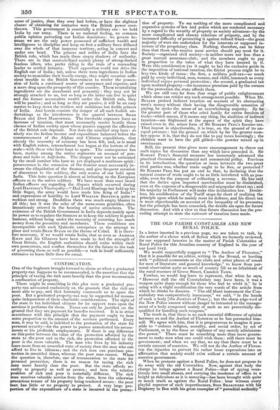TOPICS OF THE DAY.
INDIAN AFFAIRS.
Tea terrible amount of' the loss of life in Cabul is apt to induce those who form their opinions upon isolated impressions, as most men do to overrate the consequences of the disaster. From the Duke Of WELLINGTON downwards, every dispassionate man who understood the subject foresaw that the crusade in favour of Semi
SWAB must lead to a protracted and expensive war. The details,
the Peculiar form and pressure of the mischief, they could not pre- dict. They could not forebode the awful butchery which has
occurred-the time, place, and manner in which lives were to be
lost and treasure wasted; but they knew that both must be wan- tonly squandered, without the slightest prospect of real ultimate gain. While, therefore, the unreflecting projectors and encouragers of that infatuated measure are appalled by the results of their own act, they who denounced it from the first are in a condition to esti- mate our position and resources, and to consider with perfect self- possession the most advantageous course of action under existing circumstances.
The position of the British forces West of the Indus is neither desperate nor disheartening. We are in the possession of Kelat and Candahar ; and the communication of these positions with Bombay is open. Jellalabad still holds out ; and the Sikhs, through whose country the communication from the Presidency of Bengal must be kept up, are friendly. There is every reason to believe that they will continue so. There is an inveterate hatred be- tween them and the Afghans, originating in and fostered by the pre- judices both of race and religion. The Sikhs can have no sincere or lasting friendship with the Afghans ; and to quarrel with the British on their account would be to place themselves between two fires. The wealth and efficiency of the British Government in India, and the intellectual character of those who direct it, render it able not only to make great and energetic efforts, but to maintain a protracted struggle without flagging. The Afghan population is not dense ; it is broken up into a multiplicity of rude clans, devoid of a common aim, jealous of each other ; there is no man among them of sufficient command or influence to organize them for a con- tinuous defence. It is only in the vicinity of Cabul that the tribes have been roused to an enthusiastic and successful attack upon the British ; and even in that district, it is clear that the effervescc nee had already begun to cool. AKHBAR KHAN had been unable to rally the clans for an attack on Jellalabad; and they were already be- &fling to decide upon the claims of various chiefs to the sovereign authority. It is an easy matter for a Government possessing such resources as the British in India to concentrate its forces upon the region around Cabul. It is there alone that any thing has been done which the British Government is bound by self-respect and in self-defence to punish. And the inhabitants of that region are not in a condition to oppose such an overwhelming attack as the British Government, acting judiciously and with promptitude, can make upon them.
The first duty of the British Government, then' is as plain as it is easy-to lose no time in marching such a force upon the
Cabul district as shall be able to reduce its inhabitants to surren- der at discretion. The true economy in such a case is to com- mence operations at once on a sufficient scale to bring the affair to an immediate settlement. Whatever may have been the mo- rality or prudence of our first interference, there is no other course for us now. Rude though the Afghans be, they know that false- hood and treachery are indefensible. Nor is their love of national independence a sufficient excuse for the atrocities they have been guilty of. The Afghans have on many occasions-when they usurped the throne of Persia, and founded dynasties in Hindostan-when their chiefs intrigued alternately with the British, the Persians, and the Russians, to promote their own selfish views-shown how lightly, when they had any object to serve, they could regard national independence. They have done what they cannot defend ; and the British Government is bound alike by the principles of justice and self-preservation to make them feel, that the moral principles taught by their own mollahs, and reverenced even amid the clash of arms, are not to be violated with impunity. The next duty of the British Government is equally dear-as soon as the Afghan clans have been made to feel its strength, so that there can be no mistake either on their part or on the part of
any Oriental nation as to the motive of the retreat, to resume the frontier of the Sutledge, and withdraw every. British soldier from
the Vest of the Indus. It is useless to theorize on the occupation of India by this country : we govern it as a dependency : in the stage of social improvement which it has reached, it would lose infinitely were the British authority withdrawn ; and as to preparing it for self-government, that must task the native energies in some incalculable futurity. But the maintenance of British sway in India depends upon the conviction of the inhabitants both of Britain and India that the connexion is for the benefit of each. The benefit derived by the inhabitants of this country from the connexion is chiefly indirect--the protection and encouragement afforded to their commerce, by the preservation of law and order in India, through the instrumentality of a strong general government. The benefit which the inhabitants of India may derive from British ascendancy is more immediate. Compared with the best European modes, our Indian system is very defective ; but still, those tribes who are subjected to English rule enjoy a more economical and more powerful government, animated by a more steady enlightened
sense of justice, than they ever had before, or have the slightest chance of obtaining for centuries were the British power over- thrown. This government is essentially a military one : we hold India by our army. There is no national feeling, no common public opinion pervading our Indian dominions : we govern be- cause we are the only power possessed of sufficient wealth and intelligence to discipline and keep on foot a military force diffused over the whole of that immense territory, acting in concert and under one head. The princes and nobles of India hate the British rule, which has made them empty shadows of authority. There are in that semi-civilized society plenty of strong-limbed fearless idlers, who prefer riding in the train of a marauding leader to settled industry. Their opposition could not drive the English out of India ; but, unless there were ingredients in Indian society to neutralize their hostile energy, they might occasion suffi- dent trouble to the British Government to render the posses- sion of India a continued source of annoyance and expense, and a mere drag upon the prosperity of this country. These neutralizing ingredients are the merchants and peasantry : they may not be strongly attached to us, but so long as the latter can live in quiet and the former accumulate wealth under the British rule, they will be passive ; and so long as they are passive, it will be an easy matter to keep down the restless and ambitious but feeble princes of India. And herein consists the danger of all such foolish un- dertakings as the interference in the quarrel between SHAH SWAB and Dosr MAHOSIMED. The inevitable expenses force an increase of taxation, that must necessarily render hostile those classes of Indian society upon whose passive support the efficiency of the British rule depends. Nor does the mischief stop here : so nicely was the Indian income and expenditure balanced before the commencement of the Afghan and Chinese expeditions, that already the necessity of economy has been felt, and, as is usual with English rulers, retrenchment has begun at the bottom of the scale—with those who have least to spare. The consequence has been, mutiny among the native regiments on account of pen- sions and batta or half-batta. The danger must not be estimated by the small number who have as yet displayed a mutinous spirit : perseverance in the extension of the frontier must necessarily in- crease the dilapidation of the finances, and give frequent occasion of discontent to the soldiery, the only source of our hold upon India. This Latta question is almost as irritating to the European officers as to the native soldiery. We have more than once heard Indian officers say regarding the dispute which occurred during Lord HASTINGS'S Viceroyalty—" Had Lord Hastings but held up his little finger, the army would have made him King of India!" and expressions of hostility to Lord Wimasid BENTINCK quite as reckless and strong. Doubtless there was much empty bluster in all this ; but it was the echo of the mess-room grumbles, often incautiously uttered in the hearing of native attendants. The existence of the British Government in India depends mainly upon its power so to regulate the finances as to keep the soldiery in good- humour, without being under the necessity of extorting too much money from the peasantry and merchants. These conditions are incompatible with such Quixotic enterprises as the attempt to place and retain SHAH SUJAH on the throne of Cabul. It is there- fore necessary, if we would retain India, that as soon as A ICHBAR KHAN and his Ghazees have been made to feel the strength of Great Britain, the English authorities should retire within their own possessions, and confine themselves for the future to the task of governing them as well as possible—a task in itself sufficiently extensive to leave little time for ennui.



























 Previous page
Previous page